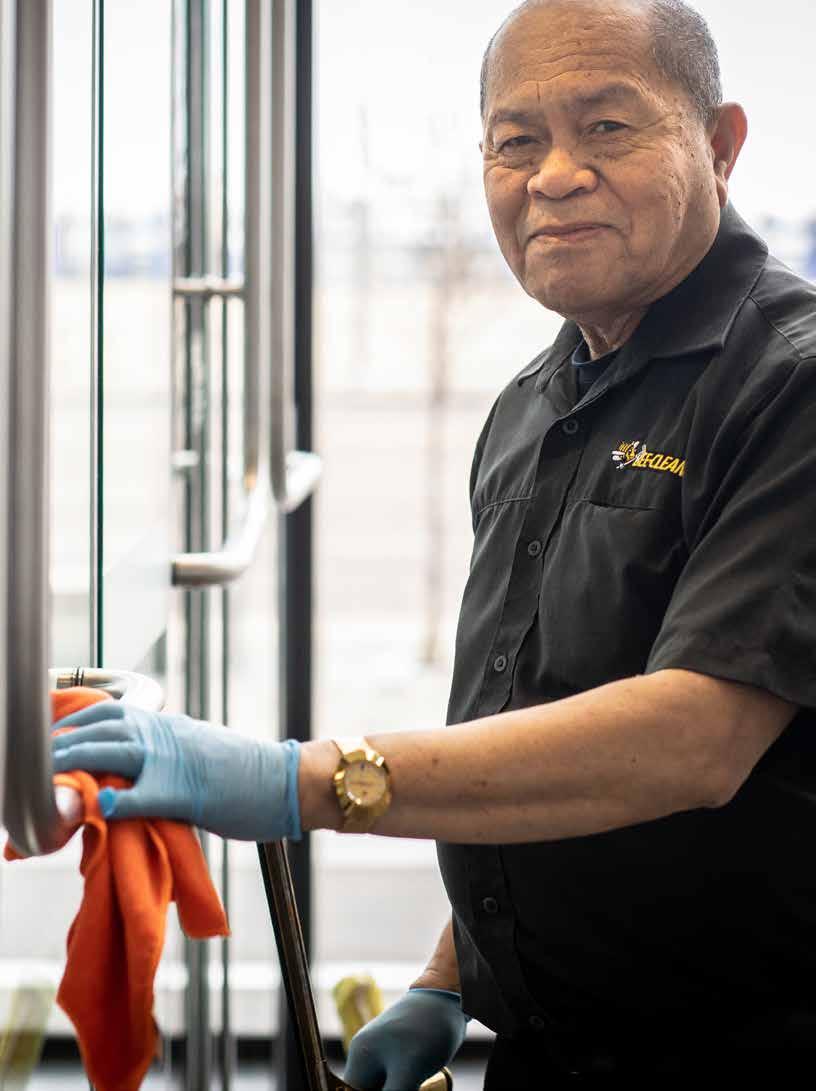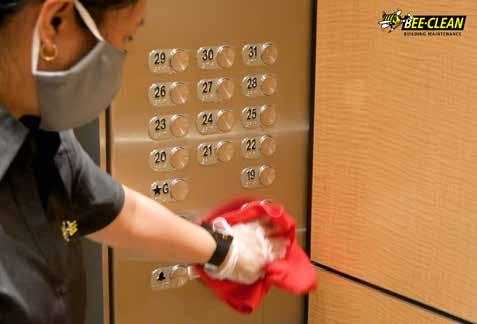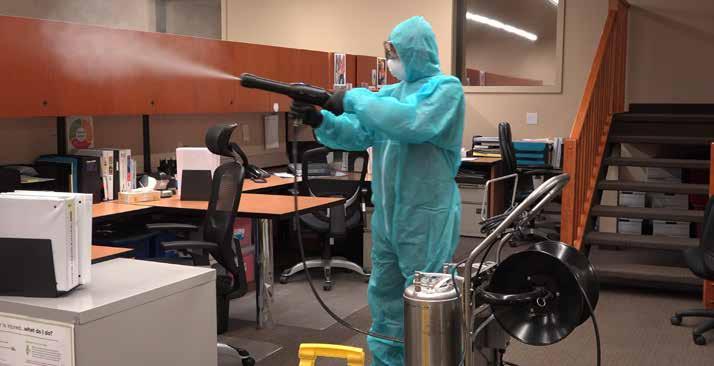
8 minute read
Leading By Example
from FCM&M Spring 2021
by MediaEdge
Bee-Clean, Canada’s largest janitorial service provider, has navigated COVID-19 with the expertise, dedication, and familial values that have served it so well over the decades.
by Tom Nightingale
Advertisement
Even for Canada’s biggest cleaning service companies, the last 12 months has been an unprecedentedly challenging time. The COVID-19 pandemic has brought a renewed focus on cleaning for health, enhanced existing disinfection and sanitization protocols, and reinforced the importance of communication of health and safety measures. In many ways, the industry may never be entirely the same.
The necessity to move quickly to evolve and adapt has been no different for BeeClean, Canada’s largest janitorial service provider. There have been numerous challenges faced and lessons learned, explains Philippe D. Mack, the company’s Canadian SVP of Customer Experience, but retaining their high levels of service and client care has remained paramount.
“We always prioritize optimization of the delivery of our services to keep our associates, students, and customers safe,” says Mack. “We’re a very humble organization. Our culture, our people, and our customers are critically important. We continue to look to the long term; to supporting people and staying focused on augmenting the ease of doing business with us.”
AN ESTEEMED HISTORY
For Bee-Clean, relationships have always been key.
The company was established in 1967 by the Correia and Gingras families out of Winnipeg and Edmonton. “Those are the ambassadors and the leaders that made us what we are today,” emphasizes Mack. That has endured, too: co-founders Joe (Jose) Correia and Brian Gingras remain the company’s principals to this day, with the next family generation, Dennis Correia, Rob Gingras and Rob Scott solidly in place leading the business.
That familial feeling extends from the top down. Mack acknowledges he has been in the cleaning industry “since birth” as a member of a family whose janitorial service history dates back to the 1920s in Montreal. He says BeeClean’s founding families have “entrusted” him as the Canadian national face of the company. Mack joined Bee-Clean in August 2018 and has been a member of

PHILIPPE MACK, CANADIAN SVP OF CUSTOMER EXPERIENCE
ISSA Canada’s Building Service Contractor Council since last year. He also serves as treasurer for Building Service Contractors Association International, an association representing North American BSCs. He’s the only Canadian on the board.
Over the years, Bee-Clean has grown province by province due to the efforts of its leadership and staff and the support of its clients and supplier partners. It now has about 5,000 client locations across Canada, services more than 400 million square feet of facilities, and employs around 14,000 associates. In 2020, the company was a winner of Canada’s Best Managed Company, which Mack calls “a big achievement for a very humble family-owned business.”
While the industry has evolved greatly over the decades of Bee-Clean’s existence, the firm’s main focus has never wavered or altered: optimizing customer safety and perpetuating the ease of collaboration. “That’s always been in the company’s DNA,” notes Mack.
PERSEVERING IN A PANDEMIC
Prior to COVID-19, Mack describes BeeClean’s operations as stable and routine. Naturally, there were challenges. Logistical problems to be solved, fluctuations on the labour and supply side; everything a company of Bee-Clean’s extensive reach in this key industry would expect to face.
As the full extent of the pandemic became apparent, of course, certain things had to change. At first, it was “absolute uncertainty,” admits Mack. Bee-Clean had to rapidly develop new procedures and processes that complied with the requirements of both facilities and provincial or federal health units.
One considerable factor that allowed BeeClean to hit the ground running was its offices in Shanghai and Beijing, which Mack calls a strong catalyst in helping them get ahead of things. A pandemic management team was activated in January 2020, around two months before Canadian provinces began to declare their respective states of emergency in response to spiking cases and health recommendations. Bee-Clean was highly proactive; more, perhaps, than most companies were able to be.
Even with that preparation, the challenges intensified.
There were employee shortages either due to illness or fear of travelling or returning to work environments. Technology and supplies like electrostatic sprayers and PPE had to be sourced amid shortages, often at very short notice. Different financial models had to be developed for customers to reflect those new processes. A huge amount of work had to be put in on the back end for contract tracing. Many of the core fundamentals of staff training shifted, and huge emphasis was put on the details.
In short, says Mack, Bee-Clean essentially transposed the disinfection protocols and procedures of healthcare institutions into all other business environments. “We’ve needed to ensure that not only were our staff protected while working but our clients are equally protected. What was done before could no longer be done; we’ve almost had to recreate the concept of our work.”
EDUCATIONAL FACILITIES POSE UNIQUE CHALLENGES
Bee-Clean’s work encompasses a vast range of facilities, from retail to airports and much in between. That, clearly, means many of the challenges also vary. The dynamics of business sectors have behaved very differently, and that has necessitated a huge amount of focus and flexibility.
When it comes to educational facilities, the scope of the task is hard to comprehend. Bee-Clean works with schools, colleges, and universities. In many cases, those post-secondary institutions can be vast, expansive campuses with a whole host of varying facilities on-site. There are classrooms and residences, yes, but also break rooms, food and beverage outlets, healthcare, sporting amenities, retail, childcare. The list, truly, is huge. It makes for a cleaning and maintenance task of gargantuan proportions. Mack understatedly describes it as a “unique” environment.
Operational hours and locations have shifted, too. Some buildings that normally run standard business hours have become almost 24/7 operations because they were identified as the safest to keep open. Bee-Clean had to rotate its staff and requirements in accordance with which facilities were operational. “We have to be close to where things are happening so we can quickly get into those areas and disinfect them,” explains Mack. “Those dynamics have been very challenging.” He offers as a notable example the fact that some institutions had to accelerate their

�A BEE-CLEAN ASSOCIATE UNDERTAKES DECONTAMINATION FOGGING OF A SHARED WORKSPACE.
education programs to graduate students in fields such as nursing much more quickly to enter the health services field to assist with the pandemic. “There was a spike in activity in some specific buildings, and that really turned things upside-down in terms of requirements.”
There has been much talk in the wider cleaning industry of the shift to what has been termed “cleaning for health”. That has certainly been the case in the education field, and communication and transparency became even more key. “We needed to communicate clearly that the environment is safe, both from a client requirement and a company perspective,” says Mack. As well as the basic need to keep janitorial staff, educational staff and faculty, and students safe, with schools and daycares in particular, there is a significant parental perspective at play. “Parents and family want to know exactly what’s happening. The communication aspect is really critical.”
It is also worth noting that much of the work in educational institutions is collaborative. Many educational facilities have their own in-house or associate teams with whom firms like Bee-Clean must align their services. “You’re really working side by side with employees or associates of the university who are often doing similar work,” notes Mack. “You would likely not see that as much in a commercial office environment or a retail environment.”
KEEPING UP WITH THE PACE OF CHANGE
A commonality across all sectors of the cleaning and maintenance industry has been that the goalposts have moved time after time, and often with little or no warning. Facilities have opened, closed, and reopened. Lessons have been learned across the board, from best practices to the technology and equipment used, as society got a firmer grip on how it should be responding to the pandemic.
Once again, Mack and Bee-Clean are grateful for the indications they received from their Chinese operations and, in turn, the work of their pandemic team. “Keeping abreast of changes was really important and our national pandemic team really took care of that,” Mack reflects. “One day, you have one process in place, and the next day — or even the next hour — it could all be changed, taken apart and put back together again. That was just the reality.”
Mack hails the leadership of the Correia and Gingras families over the last 12 months and noted the company was in the “fortunate” position of being able to stay the course as the pandemic unfolded. While some associates were laid off at the site level and migrated to other sites, the focus has remained on the long term; on supporting the company’s associates, clients, and customers.
As for what that long term may bring? Mack and Bee-Clean’s management are not kidding themselves, noting that the uncertainty of the second wave is still prominent, and the true impacts will not be felt for some time.
Questions remain. What impact will the second wave ultimately prove to have? What else has Bee-Clean not taken into account? Mack acknowledges that mitigating the speed of transmission remains paramount.
“This is not going away, as far as we’re concerned,” he concludes. “It’s going to be part of a new global cleaning protocol going forward. It’s hard to say if this is going to be permanent or temporary but we have to assume it will be long-term, if not permanent. The demand for cleaning for health, and communication and validation of those methods, keeps growing. This is becoming the norm and it’s what clients are looking for.”
One thing is certain. With its familial leadership, the expertise of its team and industry veterans like Mack, its shared best practices and attention to detail, and its adaptability and proactivity, BeeClean is well-equipped to continue its 50+ years of success, come what may. /







